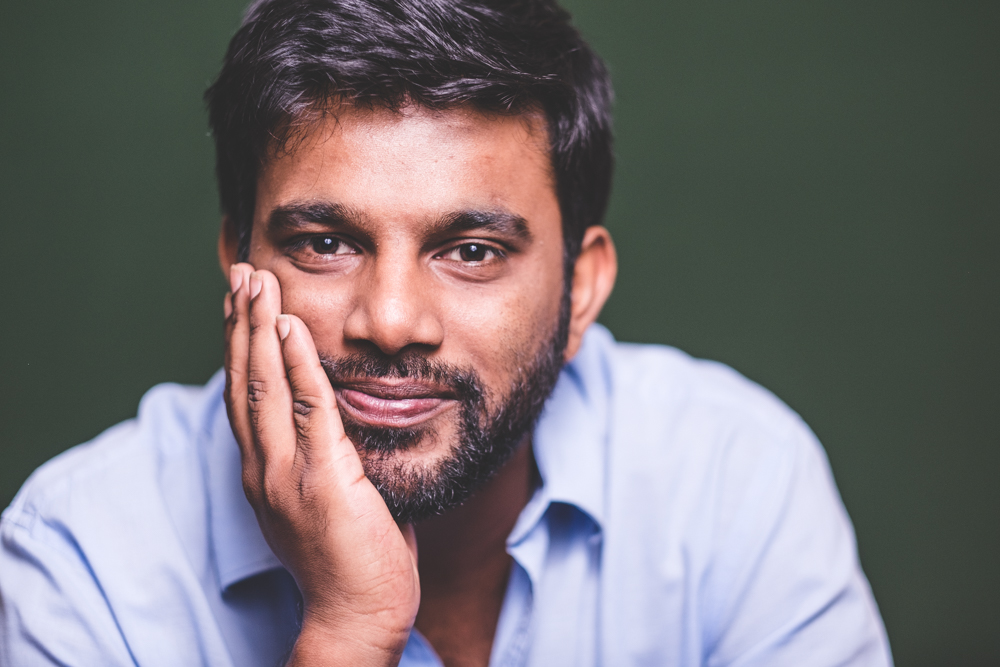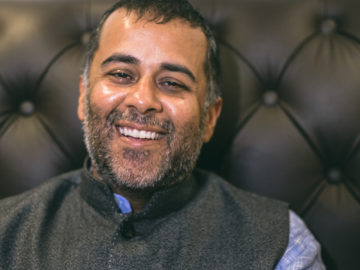We’ve read that the idea for Mukti Bhawan, the film, came to you while you were backpacking through Varanasi and came across this place. But what is it that made you go, this is it I’m making a movie?
For me it was two things, one was the fact that it made me laugh thinking about this place where you have 15 days to die, otherwise you have to checkout. When something makes you laugh, I think that’s a good starting point. And two, at the same time there was a depth to the place and what it means to the people. I thought of it as a place where people get mukti, literally become free not just in the sense of death but also of responsibility from the family’s perspective. I’ve seen my parents and the people around me take care of their parents. They find it difficult to manage their own life but they still feel they have to take care of their parents, you know the kind of little roles we play in our lives. I find that interesting. I can articulate it this way now that it’s done, but at that time I didn’t really know why. For me when an idea gets fully formed it’s almost like different elements coming together and you go, ‘wow’. There are 2-3 things that somehow fit like a puzzle. So it was somewhere along those lines.
So was Mukti Bhawan a place where you could tell a story like this about families and the roles everyone plays?
I think stories are like that; they are in a way vehicles to take us somewhere.
Mukti Bhawan was a vehicle for me to tell the story of these people. I have thought about what else could have been, like it could have been the manager’s film, the guy who manages that place. I always thought that could be a comedy. Maybe a spinoff later, like Breaking Bad has with Better Call Saul.
Death seems to be a common theme running across the last couple of your films, Mukti Bhawan as we know and even Kush is against the backdrop of Indira Gandhi’s assassination and how a teacher protects the only Sikh boy in the class during their return journey from a field trip. Is that a fascination or maybe an obsession?
Ah! You know the next film I make will be very young, only mid-20s actors, people my age. No character can be over 30. No one will die. But no, I’ve never thought of both those movies to be about death. Like in Kush, for me there was an element of thriller in it. When the idea actually started playing in my mind it was like a fairy tale. You know, these 17 kids lost in the woods trying to get back home. That is a fairy tale. And then you put the cultural context. That movie for me was about the humanity of India, which is something we struggle with.
Mukti Bhawan is also really about the relationships; I thought it could be about the warmth in relationships, so really the opposite of death in some way.
Telling a story of warmth and life and this family and their little problems and things like that. So yea they ended up having death somewhere in them and now people think I am a morbid person, or maybe I am, I don’t know.
Talk to us about how a story gets formed, the gestation period, from the time you get an idea to the time when you actually get into the drudgery of writing it or maybe just before you start making it. How do you go through that period?
So, when I have a thought I almost don’t do anything for months. That thought should keep coming back on it’s own, like when you are out on a walk, or in the shower. I think that’s the time when you’re like a kid with Lego. In your head you are just collecting information and exploring possibilities. When it comes to writing it is all about routine for me. Wake up, write, eat a little, write and turn off the Internet obviously. But to get to this point of writing, I have to feel like my brain will explode with the ideas and thoughts I have. I really love this part, watching films, making playlists, finding images. Once you start making the film, there’s people looking at you, there are questions, then there’s the whole ‘time is money’ thing. There are all these responsibilities and you are trying to be professional about them.
So during this time when you let it all soak in, is there a time limit you are working with?
It’s been different each time, but there has been a deadline somewhere. The first one was a part of my college, so there was a deadline. Or because now my mom said she would kick me out of the house if I did not get a job or something. That is a really good way to get work done, by the way. I am really scared how long the next one might take. I think I should put a time cap on the next one. I probably need to tell my mom to find a new way to threaten me.
You’ve said that the biggest challenge during the making was the budget, so how do you overcome something like that?
You can’t, you know, overcome that and get more money or something. But because we had a little fund from 3-4 filmmakers, the joke we made was, ‘it’s not a low budget film, it’s a love budget film’. So the way we did it was to find solutions. Like, how do we use the same room as two different locations or who do we go to and borrow props, rather than buy them. And working with people who are young and hungry, not even young because even Lalitji, who played the father, was so enthusiastic. It was his second film and he’s playing a lead role at 70 something. This is a person who sleeps at 3AM everyday and wakes up late. For him to wake up everyday at 4-5 o clock, I knew that he was dedicated. Everybody in my team really wanted to do it.
Also now that I have come out of it, it’s a different perspective than if you had asked me while I was shooting. How do you feel about the budget being low? I’d be like, ‘I’m never making films again!’
Now that you are a part of the Indian film industry, where do you think it’s at right now, with the big commercial releases on one end and the so-called indie releases at the other?
It’s where you are saying it’s at. I’ll always want to support the idea of diversity. When I go to a theater I don’t want to see one kind of film as my option. I want to see 5 different awesome movies and I want to go everyday of the week and watch those.
I love a Jurassic Park as much as I love a film from Iran like A Separation or The Salesman. I can love Mad Max and also love a Shahrukh Khan film because that’s what I grew up on.
I think each must support the other in some way. I like good stories. I always use Jurassic Park as an example because I think it’s great story telling. It’s a film that’s never left me ever and the kind of emotion it gave me was the first time I realized what cinema felt like. Sometimes I go to movies for the big emotions like wonder and sometimes I go to hear a great story from a certain part of the world. Because movies have this beautiful ability that make you feel like you have travelled. When I saw Motorcycle Diaries, I remember I felt like I was on this road trip with these two boys, experiencing those things. I think for me where the Indian industry is that we can definitely do more to support one another. I don’t believe in the whole big film/small film labels we use these days. Some big films are very small films. I just look at them and I’m like they don’t work for me. And I think some really tiny films are huge. You feel so much for them. It can just be two people walking like Linklater’s movies, for me that’s huge, but it’s just two people walking and a camera and no crew and whatever. So I think the big and small thing is how it makes the individual feel.
You’ve had a lot of early success, is there a pressure to perform? How do you deal with that?
It’s not like I have had stupendous success, I’ve not made a Sholay yet.
If I let the outcome be the way I hold my life, I’m going to be very very unhappy, which is necessarily not the case now. It’s not about the Oscar, that’s a thing that is not in my control so I really have to put an effort in not even thinking about it. But its more about, can I make the next thing. Can someone see this film and trust me to handle the next one. Whether it’s to give money, whether it’s an actor or cinematographer I really want to work with or something like that. I have just done early work. I have worked early. Lets just say that. I am happy about that.
Watch Shubhashish talk about the ten minute standing ovation received by Mukti Bhawan at Venice International Film Festival and the Bollywood Club
Do you desire to one day make this big blow out Bollywood movie with 600 extras, you standing there with a megaphone and directing?
Yea if that story comes to me. I never want to limit myself, imagine at 25 I start limiting myself. ‘No I am only going to make a certain kind of film in this budget, isse zyada hua toh mein nahi kaam karoonga (if it’s more than a certain amount then I won’t work)’. It’ll be crazy you know. The world is so full of possibilities I don’t want to entrap myself in not exploring those and telling stories that I want to tell.
I want to keep an open mind and I want to be allowed to be a 25-year-old guy who is still figuring it out.
What are the kind of movies you want to make, now that you have made Mukti Bhawan, are there any other stories out there that you are thinking about?
There are so many stories and I just want to make a lot of films. I like all kind of movies so whatever stories I can tell in my way I am going to go do that. Even though I find it very difficult to watch a horror film you know, there are stories from my school in Mussoorie that I might want to tell. We used to go hiking a lot and we did the cliché thing with campfire and ghost stories of Gharwal and all. I think if I ever make a horror film I am going to make a Gharwali horror film. It was so scary when we heard it in the tents, like I couldn’t sleep, you feel so scared at night to go behind the tree to pee. I don’t know why they did that to us. You know horror stories about animals, about spirits; we have a whole culture around these horror stories.
Do you think film makers like you who have had the opportunity to go abroad and get access to producers are also a part of a privileged filmmaker set, do you feel that?
I feel super lucky because I know that not everybody gets to study film. I also believe that if you go to film school, you don’t necessarily become a filmmaker.
I think a filmmaker can come from anywhere. You don’t necessarily have to assist or go to a film school.
You can do those, but those are just two ways. A great thing about filmmaking is that you can be from any walk of life and somehow find your way into it with a great story to tell. But I do feel I am in a place of privilege, I had this opportunity, my family did support me to go study and if I shy away from that it’s completely ridiculous. I had a chance to learn and most importantly I had a chance to leave India for a bit and that’s when I really started understanding India a bit more ‘cause I got a chance to go outside and see how it’s different and then come back and see it again in a new light and you know you need that little break, to discover yourself obviously and experience new things.
Any advise for someone who is about to start writing their first film?
Umm… I don’t know, find a therapist early.
But no, I would say you just have to do it. I think the best way is actually to try and make movies and making a movie will actually help you become a better writer because you start to write more for that. It’s very different from writing a novel. So I’ll say that watch movies, read scripts and make movies. You know also the other things which we always say, observe life, listen to people. My mom, when I was unemployed, would give me the newspaper and ask me to read it. I was so amazed that was like an act of acceptance that I am doing this. And yea physical exercise, which I don’t do enough, I am very lazy.
Unspool
Meryl Streep or SRK – who would you like in your next film?
I’d pair them off. No but I have a sweet spot for Meryl Streep, crush level, age is just a number.
Do you mention your Oscar short-list in your Tinder Bio? Tell us your Tinder Bio.
I don’t have tinder. No really, I’m so scared of my mom, all these issues are coming out. “Scared of mom” on my bio, I’m going to get so many matches then. Oh mumma’s boy!
New York or Mumbai – if one city had to be plunged under water which one would you choose and why?
Aye yaar, I have friends in both and family in one. Ummmmm… you said no personal questions. Of course, I’m sorry New York City, but every superhero movie destroys you so it’s not that big of a deal. I wanna see you go. You should blame Hollywood.
If you were going to die – what would your last meal be?
I love food. I have a crazy obsession with momos, ‘cause we had lots of that when we were in school. It’s like my childhood. Butter chicken or momos. You know I used to make like a butter chicken and fried rice combo.
Strangest reaction you got for making a movie about death?
Everybody thinks that the son is going to die in the film, like he takes his father but the son is going to die. Like how. But I think it’s amazing that people think that. I don’t know whether they think he is going to murder him or what is going on, but maybe that’s the giant twist they are expecting.
Your favourite app?
I like Instagram. Visual ones are nice. And I miss Spotify.
One film in the last 1 year you wish you had made?
I liked Whiplash a lot. I thought that was a great film.
What’s more difficult, writing or the process of making the film?
Writing. Both actually. But writing, it’s like the foundation of the movie, without it everyone’s just a headless chicken. I think writing is like, you’re going inside yourself and searching. Writing.
Who is that one person who always checks your ego?
Oh everybody man.
My mother, I’ll show you her messages like bill nahi bhara, ye nahi kiya, woh nahi kiya.
I love being with her ‘cause it’s always like a blast. But no all my friends also, because of my love for detective novels, my friends always introduce me to others as this Noir filmmaker. I have never made a noir film. I don’t know if it’s because of that or because they think it sounds fancy.






